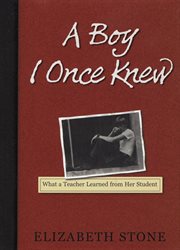Nonfiction
eBook
Details
PUBLISHED
Made available through hoopla
DESCRIPTION
1 online resource
ISBN/ISSN
LANGUAGE
NOTES
One morning, a box was delivered to Elizabeth Stone's door. It held ten years of personal diaries and a letter that began "Dear Elizabeth, You must be wondering why I left you my diaries in my will. After all, we have not seen each other in over twenty years . . ." What followed was a remarkable year in Elizabeth's life as she read Vincent's diaries and began to learn about the high school student she had taught twenty-five years before. A Boy I Once Knew is the story of the man that Vincent had become-and the efforts of his teacher to make some sense of his life. With his diaries, Vincent becomes a constant presence in her household. She follows his daily life in San Francisco and his travels abroad. She watches him deal with the deaths of friends in the gay community. She judges him. She gets angry with him. She develops affection and compassion for him. In some ways she brings him back to life. And in doing so, she becomes the student, and Vincent the teacher. He forces her to examine her life as well as his. He challenges her feelings and fears about death. He proves to her that relationships between two people can deepen even after one of them is gone. A Boy I Once Knew is a powerful book about loss, memory, and the ways in which we belong to each other. This is a revealing, moving, and wholly unexpected book. Elizabeth Stone is a teacher and journalist and the author of Black Sheep and Kissing Cousins: How Our Family Stories Shape Us. She lives in Montclair, New Jersey, and teaches writing and literature at the Lincoln Center campus of Fordham University in New York. The bell rang the first thing in the morning, even before the coffee was on. At my front door was the mailman, who handed me a large carton, its return address in blue block letters telling me it was from Vincent in San Francisco. This was odd. In the twenty-five years since I had been Vincent's ninth-grade English teacher at New Utrecht High School, he had never sent me anything but a Christmas card, though he had rarely missed a year. The last card--"Van Eyck's Gabriel," it said on the back--was still propped up on a bookshelf in my living room. As usual, it didn't say much, just "Dear Elizabeth" above the printed message and "Love, Vincent" below, but on the back, he'd drawn a circle around "Gabriel," the name of my younger son, so I knew he'd chosen the card for me. When you're a teacher, some students burst out at you immediately, most emerge gradually, and a few don't want you to see them at all. By December, Vincent had never raised his hand, and although his serious brown eyes met mine from time to time, when I called on him, he merely shrugged. It was a gray day in Brooklyn, and I'd assigned my English class O. Henry's "The Gift of the Magi," set on a long-ago Christmas Eve in Manhattan. It was about Jim and Della, young newlyweds who wanted to give each other the perfect Christmas present. They had very little money, and those who read all the way through knew that they did find the right gifts for each other, but only after Jim pawned his heirloom gold watch to buy Della the jewel-rimmed tortoiseshell combs she'd so admired, and Della cut and sold her long hair so she could buy Jim a platinum watch fob. It was a touching story, and as the kids thudded their textbooks onto their desktops and shuffled around for the right page, I waited, curious as to what it had meant to them. At twenty-two, I was still a very new teacher, nervous and chronically overprepared, so the night before, I had written up a long list of questions to get the discussion going. But before I could ask even one of my questions, Vincent shot his hand up into the air. Then without waiting for me to call on him, he announced that he hated the ending, just hated it. "How could anyone write something so stupid?" he said, his eyes flashing indignantly. "The
Mode of access: World Wide Web







